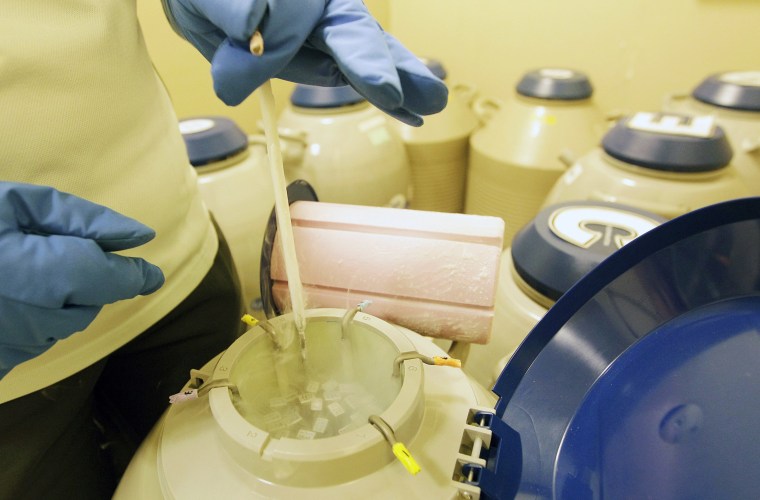After two fertility clinics in different parts of the country experienced "major failures" at the same time, there are growing questions about the level of oversight at egg-freezing facilities.
On Monday, the industry group that inspects most fertility labs told NBC News that there's no requirement for a clinic to report problems unless there is a complaint filed or a negative news media report.
The College of American Pathologists, the group that accredited the two clinics, was not contacted by the fertility clinics until after news reports alerted the public about the possibility that thousands of eggs and embryos may no longer be viable because of equipment malfunctions, a spokeswoman told NBC News' Kate Snow.
In San Francisco, patients of the Pacific Fertility Clinic learned over the weekend of a failure in its liquid nitrogen tanks. On Saturday, the clinic began notifying 400 patients who had several thousand eggs and embryos stored in a tank that malfunctioned on March 4.
Although fertility clinics are required to notify the CAP of a problem within two working days, the San Francisco lab reported the problem with a liquid nitrogen storage tank a week after it occurred.
Earlier, the group was notified of an equipment failure at an egg-freezing facility in Cleveland, which also occurred on March 4.
Two class-action lawsuits have been filed in Cleveland against University Hospitals Fertility Center related to the malfunctions.
One suit, filed by a Pennsylvania couple who hoped to go through in-vitro fertilization before being notified of the equipment failure, alleges that alarms did go off when the tank became too warm on March 3, but no one was on site to hear them until the next day.
Fertility labs are largely self regulated, accredited by industry groups and inspected, on average, every two years. There have been previous reports of frozen eggs or embryos lost or destroyed by fertility clinics, but the infertility community is reeling after the two latest disasters occurred almost simultaneously, affecting hundreds of patients at each clinic.
"Indeed, there is angst throughout the infertility community, patients and professionals alike," Sean Tipton, chief policy officer of the American Society of Reproductive Medicine, said in a statement. "We can assure our current and future patients we will do everything we can to understand how these incidents occurred and how we can help our members work to prevent other such incidents from occurring."
Both labs are now apologizing to patients.
"We are so very, very sorry," said Patti DePompei, president of University Hospitals' MacDonald Women's Hospital and Rainbow Babies & Children's Hospital, where the Cleveland fertility center is. "We again want to do all that we can to support them."
